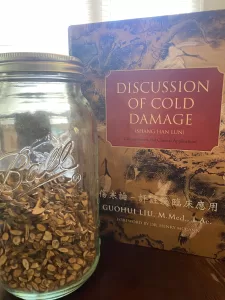
Allergy season is here! Claritin and Allegra are flying off the shelves as people fly out of their minds, unable to stop mucus from plummeting from their orifices. Eyes are itchy, sneezing on trains is incessant, peaking everyone’s concern about the guy next to them. Is it Covid or allergies? Probably the latter, but not worth the risk. As the new fight or flight of cold and flu season goes: Mask or move?
In Chinese medicine allergies are a symptom of “wei qi deficiency,” or immunological compromise, in the springtime generally due more to a weakness in the body’s blood or healthy organ fluids—in fall more to excess inflammation and/or a weakened microbiome.
Fall is the season that corresponds more with the lungs and respiratory orifices, making allergies at this time of year a bit more biologically “normal” than those in the spring. Spring corresponds with the “liver,” which is to say the functional aspect of the body that uses blood to raise cellular energy upwards and outwards, including our immunological cells. Chances are good if one suffers with spring allergies, they might also be prone to anemia, dizziness, general dryness, or blood loss (which includes childbirth!).
While OTC medications are reductionist medicine—never the most thoughtful treatment—they are understandable to use as needed, temporarily and in moderation. Over time they can indiscriminately dry out our healthy fluids, especially in allergy sufferers of the spring variety. Persons with severe blood or fluid deficiency often find that OTC allergy meds are either ineffective or only temporarily effective, causing they or their doctor to increase dosages, thereby aggravating the root cause of the condition.
Enter the first mentioned and arguably most important herbal formula in our medicine’s most important text, cinnamon branch, or “gui zhi.” Cinnamon branch dilutes blood vessels to assist in circulating cellular energy, both of the immune system and otherwise (mostly) upward. Its primary indications include those of common viruses, such as headaches, sweating, neck and body pains, as cinnamon reaches the most superficial layer of the body to ward off external pathogens and circulate fluids back downward.
Its most famous formulaic combination includes licorice, ginger, dates, and most importantly paeonia root, whose job is to mitigate cinnamon’s warm, drying qualities, to nourish the blood and protect the stomach from over-heating (in other words, a more thoughtful Allegra). Two famous modifications of this formula are one that completely omits the cinnamon, and another that completely omits the paeonia, each of which radically changes its effects one way or the other. For spring allergies, we might consider omitting the cinnamon to enhance the blood nourish effects of paeonia on the liver meridian, which is ruled by spring. Conversely, at this time of year, as we begin our descent into the colder weather, we omit the paeonia, allowing the cinnamon to run wild, warming both the body’s surface and its internal organs below.
But of course, this is Chinese medicine, and we might do neither of these. Based on one’s tongue, pulse, and oral report, we might not even use a cinnamon-based formula! Gui Zhi is just one example of our line of thought in treating the immunological challenge that are allergies.


